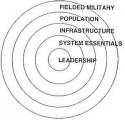The Gill Doctrine, A Model for 21st Century Counter-terrorism?
http://www.satp.org/satporgtp/public...9/Article1.htm
I think as you read through this paper you'll see many common concepts that we have discussed extensively within the SWJ council, such as:
When fighting terrorists armed with military-issue hardware, the definition of what constitutes ‘minimal force’ requires recalibration. If terrorism is after all a new way of warfare, then the Government must be prepared to combat it on a war-footing. At the same time, there remains an overwhelming need to insulate the local population from suffering disproportionate collateral damage. For this reason, the use of area weapons and airpower is to be avoided, even if the result is heightened casualties on one’s own side.he spent much of his time trying to mobilize Punjab’s Sikhs against extremist violence.21 Where he differed from his more politically-correct colleagues was in the depth of expectation he placed upon such efforts. Whilst pacifists in the Police attempted to put the cart before the horse and rally the population against terrorism before aspiring for operational dominance, Gill reversed these priorities.These are the areas I think he has in common with our doctrine, even if we fail to put them in practice. The point I want to focus on in this post is that the ability to rapidly and continuously put to put pressure on the enemy (i.e. wage a war of attrition) is to enable local police or paramilitary forces to take action. These are the forces on point, and all too often they are under equipped, under trained, and poorly led, thus we rely too heavily on speciality commando/SWAT like elements who are not able to protect the populace or respond to crisis 24/7 in a responsible time. Commandos and SWAT elements have a critical role to play, but not at the expense of ignoring action at the local level by local forces. The palace guard will never defeat an insurgency. I think back to a couple of recent school shootings in the U.S., where the police were sitting outside waiting on the SWAT teams to arrive while our kids were being shot. We are past the point of ridiculous if the common police officer isn't trained and equipped well enough to confront a unstable teenager with a rifle. Instead they conduct crowd control outside while some whacked out kid has freedom of movement to continue his rampage, all because they are waiting on grossly overweight SWAT team members (obviously poorly trained) to arrive several minutes later (VA) to respond to the incident. This same mind has creep into our COIN practices, and we need to aggressively reverse it by sufficiently training, arming, and equipping local forces to deal with the threats at their level.One of the Gill Doctrine’s most significant contributions to the study of low intensity conflicts has been the concept of a ‘societal Stockholm Syndrome.’23 This concept holds that even in instances where popular support for militancy appears high, it may not be so in reality. Rather, such support might only amount to a survival tactic adopted by populations living continuously under the shadow of the gun. Once this point is appreciated by counter-terrorist strategists, it becomes possible to develop a response to terrorist violence that balances political sustainability with operational effectiveness.
Gill's comments on police based intelligence and identity based terrorist groups are gold. His ideas will be highly valuable when we're advising a nation on how to best defeat the threat within their borders.The ‘three possibles’ outlined above triangulate the actions encapsulated within the Gill Doctrine, enclosing it within a complete analytical model that captures its essentials. Rapid and Sustainable Attrition (RASTA – an Indian word for ‘way’) was the guiding objective according to which the progress of counter-terrorist efforts was measured. While the Punjab Police were able to attain the first two ‘possibles’ within 19 months of Gill’s appointment as Police chief, the third was not achieved until 1992. Terrorists could be identified and surgically neutralized on the basis of good local intelligence, and at a very rapid pace, but lack of political resolve undercut the Punjab Police’s efforts. Not until the political establishment in New Delhi allowed Gill to continue his efforts without interference from would-be peacemakers, did attrition of terrorist cadres become both rapid and sustainable.
Moderator Adds
This thread should be read alongside the main, wider thread Understanding Indian Insurgencies










Bookmarks